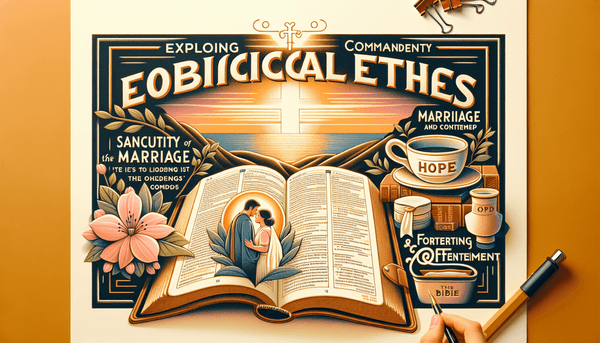The 10th Commandment: 'You Shall Not Covet'
The 10th Commandment, which admonishes against coveting, serves as a stern reminder of the importance of contentment in the biblical narrative. Coveting, as described in Exodus 20:17, is not merely a harmless desire, but a deep-seated longing that can erode the soul and disrupt community harmony. The commandment warns against the yearning for a neighbor's possessions, a sentiment that can lead to jealousy, strife, and even greater transgressions. When the Apostle Paul speaks in Philippians 4:11-12 about learning to be content in any situation, he underscores the alternative to covetousness - a life of gratitude and trust in God's provision. As Jesus Himself put it in Luke 12:15, one's life does not consist in the abundance of possessions, highlighting the call to seek spiritual wealth above material gain.
Sexuality and Marriage: A Biblical View
Within the sacred text, sexual intimacy is celebrated as a beautiful and integral part of the marital bond, a covenant designed by God. The Bible presents marriage as a profound union in which man and woman become one flesh, as seen in Genesis 2:24-25. This union is meant to be cherished and safeguarded, as expressed in Hebrews 13:4, which cautions that God will judge the adulterer and the sexually immoral. The wisdom of Scripture, such as the counsel in 1 Corinthians 6:18 to flee from sexual immorality, is not to repress but to protect; for sexual sin is unique in its consequences, affecting individuals at the core of their being. The biblical view of sexuality within marriage is one of purity, joy, and honor, reflecting God's design for human relationships.
The Promise of Ultimate Redemption
The Bible culminates with a vision of hope and renewal, a promise of ultimate redemption where God rectifies the brokenness of the world. In the apocalyptic imagery of Revelation 21:4, we read of a future where God will wipe away every tear, and death and mourning will be no more. Similarly, the prophet Isaiah speaks of a new heaven and a new earth in Isaiah 65:17, painting a picture of restoration and peace. This eschatological hope is central to the Christian faith, offering believers a future where the groaning of creation, as described in Romans 8:21-23, is replaced by liberation and glory. It is this hope that sustains believers through trials and tribulations, anchoring them in the goodness of God’s ultimate plan.
Conclusion
As we have journeyed through these biblical themes, it is evident that the Scriptures provide a comprehensive framework for living a life that is pleasing to God. The call to avoid covetousness, to honor the sanctity of marriage, to live with contentment, and to cling to the hope of redemption shapes our character and directs our actions. These teachings not only guide us in our personal lives but also influence how we engage with the world around us. In understanding the freedom we have in Christ, especially regarding practices such as dietary laws, we are reminded of the broader principles that govern our faith—love, grace, and liberty. For further reflection on living out biblical principles in everyday life, consider exploring insights on faith, temptation, and rest. May this exploration of biblical ethos encourage us to delve deeper into the wisdom of Scripture and live out its truths with conviction and joy.






